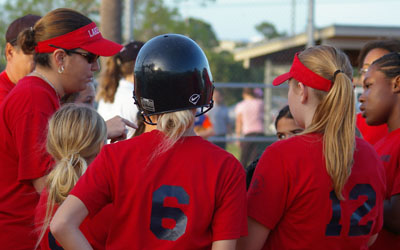My last post, Sport Parents, We Have a Problem, clearly touched a nerve in the sport parent community with more than 12,000 views on Facebook alone, generating dozens of comments and my receiving many emails and messages in respond. The responses were 99.9% supportive of my perspective (one fellow spoke out quite vociferously against it). I also saw the willingness of sport parents to “own their stuff,” meaning many admitted that they have work to do to better support their young athletes.
Before I dive into today’s topic, I want to “go positive” and“get real” for a moment. Despite the parenting and cultural challenges that are painfully evident in youth sports these days, here’s the “go positive” part, the majority of parents are well intentioned and do right by their kids most of the time (though we’re all imperfect beings and we can all do better) and sports are still an amazing environment to expose our kids to (if done right). It’s easy to complain about what’s wrong with sports, but “get real” part of this is that having kids in sport is a choice, so if parents don’t like the experiences their kids are having, they can always leave sports and find something else to do (FYI, the performing arts and chess have the same problems!).
As the saying goes, though, “It takes a village” to raise kids and that belief is equally appropriate for raising and developing young athletes.Another frequent message that I received after my last article was that parents aren’t the only ones in the sport community complicit in the torrent of tears pouring out of young athletes. That is, coaches also play a huge role in the experiences that young athletes have in sports, whether positive or negative.
Let me preface my thoughts by stating upfront that, like parents, the vast majority of coaches are in sports for the right reasons, care deeply about the kids they coach, and believe that healthy development is more important than results. During my athletic career, I had coaches who had a profound influence on my athletic development and, more importantly, my personal growth (thanks Finn Gundersen, the late Marty Heib, and Chris Jones).And I have seen hundreds of remarkable coaches over the years in my professional life.
At the same time, just like parents, coaches are also people who are as vulnerable to the messages of our toxic youth-sports culture and to the pressures imposed on them from parents and sports programs that have gone to the “dark side.” A key part of this pressure is that, at least in the elite sports programs, coaches’ careers and livelihoods depend on getting their young athletes to produce the results that many parents expect as their RIO for the investment they’re making in sports. That pressure can cause coaches to go to the dark side as well. In that vein, see below are some of the behaviors that readers of my last post shared with me about their kids’ coaches:
- Comparing training and competitive performances among athletes.
- Pitting two children against each other to promote competition.
- Making fun of the child’s “wussiness” when they injure themselves and pull out of training.
- Kids being derided by their coaches for shortening training because they were exhausted from a bad night’s sleep.
- Athletes being told by their coaches that they should prioritize sports over school.
- Swearing at them while training.
- Ridiculing them for mental weakness.
- Talking about where kids should finish in upcoming competitions.
- Athletes often hear their coach talking and laughing with other coaches about their less-successful athletes.
- Coach tells athletes how “they will never get into that event.”
- Coaches don’t confront star athletes if they misbehave or bully teammates.
- Coaches saying bad things about teammates to athletes.
- Coaches talking about their accomplishments at the same age as their athletes.
- Coaches making fun of their athletes.
- Threatening retribution if the athletes confide to the parents about coaches’ inappropriate behavior.
- Our coach has called some kids idiots.
- Coach has hit some kids.
- Coach has reprimanded kids for not having the proper technique, but never actually explains to them what to do to have better technique.
These behaviors are as egregious as those of parents that I described in my last post. This behavior is simply unacceptable and must be confronted directly when observed in your own kids or those of other parents. A few brief thoughts on this before I dig deeper into this topic.
First, the leadership of sports programs should have clear guidelines of appropriate and inappropriate behavior for their coaching staffs and have processes in place for anonymous reporting and adjudication of complaints. There should also be tough policy for misconduct by coaches. Not only is this the right thing to do, but it is the wise thing to do legally. I haven’t heard of many lawsuits against a sports program, but I assume they have occurred or will occur at some point in the future.
Relatedly, there is a new requirement by many Olympic organizations that everyone who works with young athletes in the U.S. must take and pass the SafeSport online course. I completed the course a few months ago and it blew me away. It educated me about what qualifies as misconduct and provided a clear (though admittedly uncomfortable) path for reporting inappropriate behavior. I encourage parents to as well (it costs only $20) so you know what you can and should do when you see or hear about behavior such as those described above.
Second, it is parents’ responsibility to advocate for (and protect) their children. If you see a coach acting badly, it is well within your rights to discuss what you saw with someone in a position of authority at your sports program. Unfortunately, as several parents recently told me, talking to a program director is very uncomfortable because of fear of being seen as a squeaky wheel or of word getting back to the coach about who filed the complaint.
Now, I would like to direct the rest of my post to coaches and offer some thoughts on what I call my Dos & Don’ts of Sport Coaching that will help them to be sure that they are part of the solution instead of part of the problem. They are shared with the utmost respect for all of the positive things that the vast majority of coaches do every day out with kids.
DO WITH YOUNG ATHLETES:
- Recognize that you have a HUGE impact on their athletic, personal, and social development, for good or for bad.
- Get vicarious satisfaction from the many types of success (i.e., athletic progress, personal development, social growth, academic achievement) that the kids you coach experience. That’s a big reason most coaches coach.
- Be a good role model in terms of sportsmanship,attitude, and emotions. How you are in training and at competitions influence show your athletes feel and perform.
- Maintain a healthy perspective on why your athletes compete in sports: to have fun,learn essential life skills, and prepare them for later life.
- Provide a healthy perspective about success and failure. Your athletes will likely come to define success and failure the way you do, so ensure that you’re sending them healthy messages that will foster their sport goals and nurture their personal development.
- Emphasize process and reward effort rather than results. Ironically, if you focus on process and effort, your athletes will likely have better results than if you focus on results.
- Intervene if your athletes’ behavior is unacceptable during training or at competitions.
- Establish clear rules of being good sports by setting expectations and enforcing consequences when your athletes behave badly.
- Understand that your athletes may need a break occasionally. Sports are intense and physically demanding. Your young athletes need time to rest, recover, and recharge their batteries during the long season.
- Treat your athletes with respect and kindness.
- Keep a sense of humor. If you’re having fun and laughing, so will your athletes. There are few things that kill the joy of sports for kids more than coaches who are too serious and intense. Remember that sport is just a sport and a part of life, not life itself.
- GIVE YOUR ATHLETES UNCONDITIONAL CARING. SHOW THEM YOU CARE AND SUPPORT THEM HOWEVER THEY PERFORM!!
DO FOR PARENTS:
- Express gratitude for their willingness to put their children in your hands (it is an incredible privilege and compliment to you!).
- Recognize the price they are paying and the sacrifices they are making to give these opportunities to their children.
- Treat parents with respect and kindness.
- Communicate regularly with your athletes’ parents.They have a right to know what is going on with their kids. Plus, they are less likely to call you at 11 at night!
- Inform parents of relevant issues occurring on the field of play that might affect your athletes at home, for example, conflict with teammates, low motivation, or extreme emotions. When your children head home,they take their sport lives with them.
- Make parents your allies. They can make your life wonderful or
- Listen to parents’ concerns about their children.
- Work with parents to solve problems that arise.
- Be the adult even when parents sometimes aren’t.
DON’T WITH YOUR ATHLETES:
- Tease, ridicule, demean, embarrass, humiliate, guilt, or shame them (in private or public).
- Use sarcasm. It may be funny to you but it’s not usually funny to them.
- Talk about wins, results, or rankings. You need to counteract the unhealthy messages they may be getting from their parents, peers, and our youth-sports culture.
- Lose control of your emotions.
- Abuse your athletes in any way. It’s wrong and it’s illegal.
- DO ANYTHING THAT WILL MAKE YOUR ATHLETES THINK LESS OF THEMSELVES OR OF YOU.
DON’T WITH PARENTS
- Criticize parents publicly.
- Insult parents privately.
- Work at cross purposes with parents.
- Make enemies of parents (the kids will be the ones to suffer).
- Accept parents’ behavior that you believe is hurting their children.
In sum, coaches should ensure that several forces drive their coaching. First, to know and be guided by your values. Second, to resist the Siren’s Call of our toxic youth-sports culture. Third, to support and advocate for your young athletes in the face of pressures from parents and the youth-sports culture. And, finally, always do what is best for their long-term physical, psychological, emotional, and social health and well-being.
Want to be the best coaches you can be? Take a look at my PrimeSport Coaching online course.







